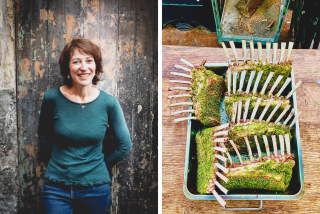Follow the pasta trail around the globe in ‘On the Noodle Road’
- Share via
You may have heard that Italy was introduced to pasta by Marco Polo, who brought it from China. It’s a great story, but it was probably cooked up by a 1920s Don Draper — it’s just not true. Italians were eating pasta before Polo was born.
How, then, did two nations half a world apart, with radically disparate cuisines, wind up making noodles that are strikingly similar? That’s what food writer Jen Lin-Liu sets out to discover in “On the Noodle Road,” traveling overland from Beijing to Rome.
Lin-Liu, a first-generation Chinese American, was raised in suburban Southern California; she went to Columbia University and afterward moved to China to explore its food and culture. She wrote about the country’s rapid changes alongside her own story of attending cooking school and becoming a chef in her first book, “Serve the People.” This book, too, mixes personal narrative with a journalist’s take on the world around her.
Lin-Liu traveled the Silk Road, selecting her path from the trade routes along which recipes and ideas might have migrated. She took about six months, giving herself time to eat lots, explore kitchens and learn to make noodle dishes along the way.
Beginning in Beijing, she ate her way across China to Urumqi, Lop and Kashgar, three regions in Western China populated by ethnic minorities. Then she continued into Central Asia, traveling through Kyrgyzstan, Uzbekistan, and Turkmenistan, harboring hope that she’d find the origins of pasta in those unfamiliar countries. Next came Iran — Afghanistan and Pakistan seemed too dangerous — Turkey, Greece and Italy.
No matter where she’s eating, Lin-Liu captures the dishes she samples mouthwateringly. This is the Iranian stew fesenjun: “Ground walnuts were toasted in pan until they formed a fluffy paste, then pomegranate molasses was added. Chunks of chicken were put to simmer in the sauce, which thickened into a gooey, tangy reduction enlivened with a sprinkle of cinnamon and saffron.”
You might notice that the dish lacks noodles — in fact, for about a quarter of her travels, pasta all but disappears. This demonstrates the distance between the idea that spurs a book proposal and the finished project: the Silk Road appeared to be the noodle road, but the center, if it was there at all, has dissolved into history.
What Lin-Liu uses to fill in the gaps is a curiosity about women’s lives. As she travels from China to Muslim countries to Europe, she asks the women she meets how their marriages work (or don’t), about the choices they have had (or not). It’s as if she’s hoping to gather enough information to help sort her way through the modern American woman’s dilemma: the can-I-have-it-all juncture of career, new husband and, possibly, children.
A good story needs a villain, and Lin-Liu has two: the country of Iran and a Central Asian rice dish called plov. She finds plov tedious and unappetizing; unfortunately, it is traditionally served to guests, so she must eat it again and again and again, an exasperation she plays for laughs. Iran is more problematic; she approaches it with a keyed-up fear that seems amplified to provide a strong contrast with the reception she gets from the people she meets — universally warm and open.
Otherwise, she is a savvy cultural guide, one whose engagement with the lesser-known areas of China and Central Asia is particularly interesting. She’s quite good at spotting connections between far-flung cooking traditions, something that was best done in the field, in small towns isolated from encroaching mass culture. When she gets to Italy, she’s enchanted by the butchers, pasta makers and cheese industry of Emilia-Romagna, a northern region overlooked by tourists who flock instead to Florence and Rome.
Each section of the book concludes with a handful of recipes, best for those already skilled enough to make pasta from scratch. Little expertise, however, is needed to enjoy the journey, an intelligent beach read that will set your stomach rumbling.
On the Noodle Road
From Beijing to Rome With Love and Pasta
Jen Lin-Liu
Riverhead: 400 pp., $27.95
More to Read
Sign up for our Book Club newsletter
Get the latest news, events and more from the Los Angeles Times Book Club, and help us get L.A. reading and talking.
You may occasionally receive promotional content from the Los Angeles Times.











